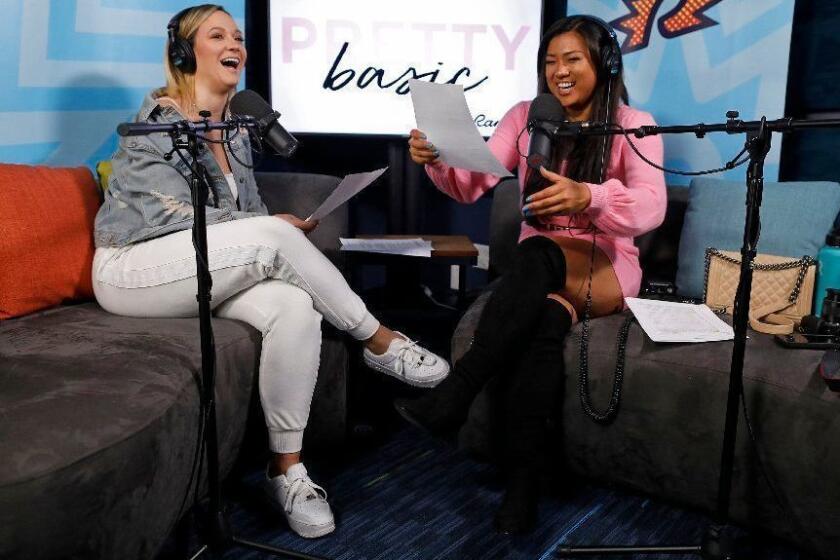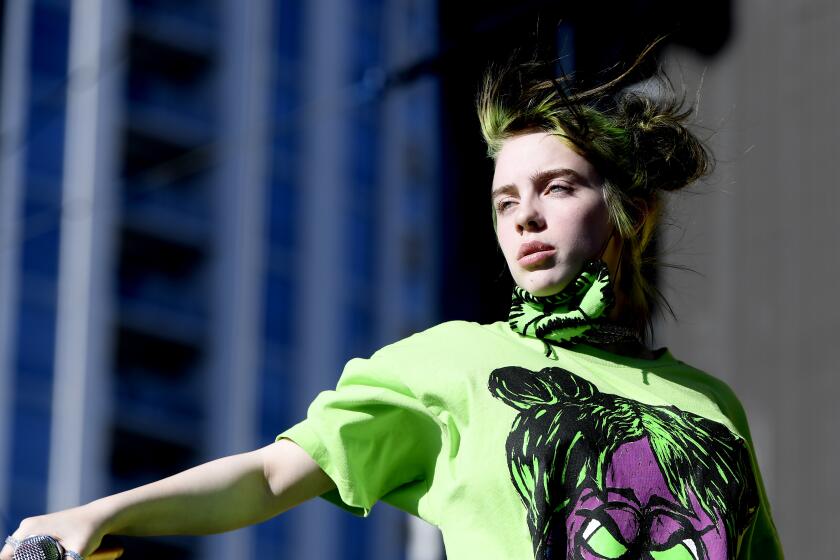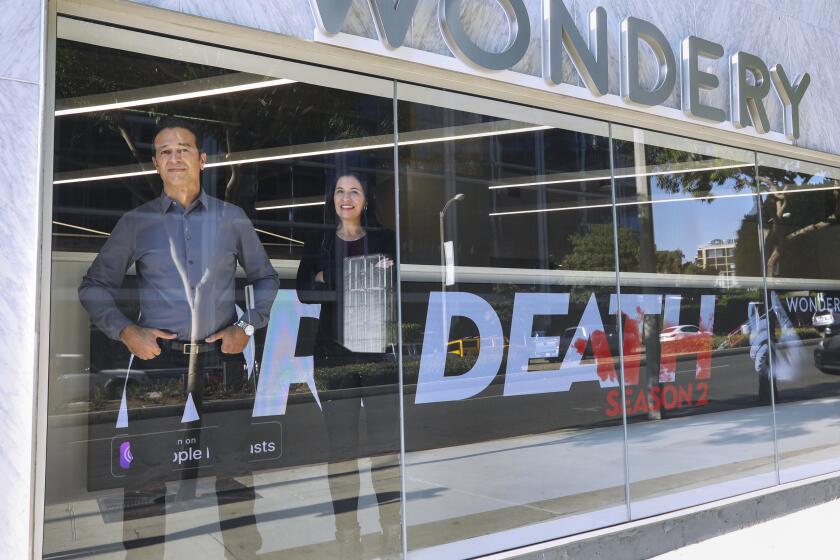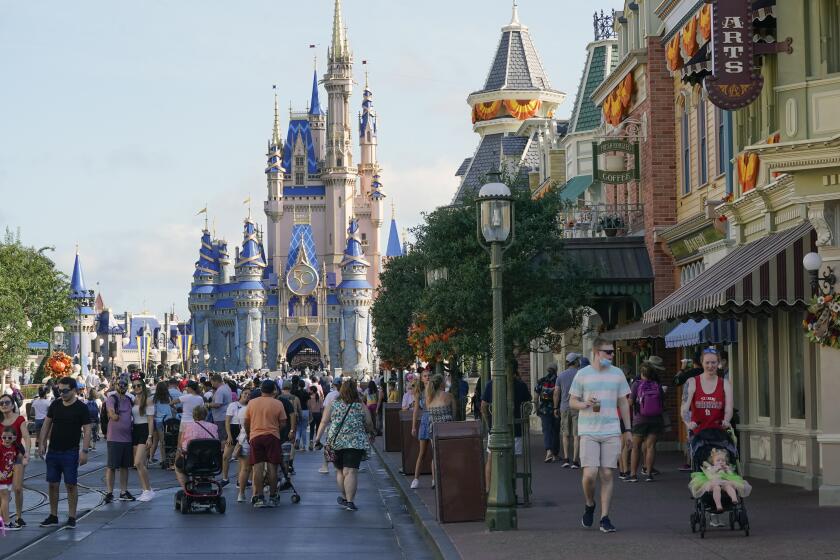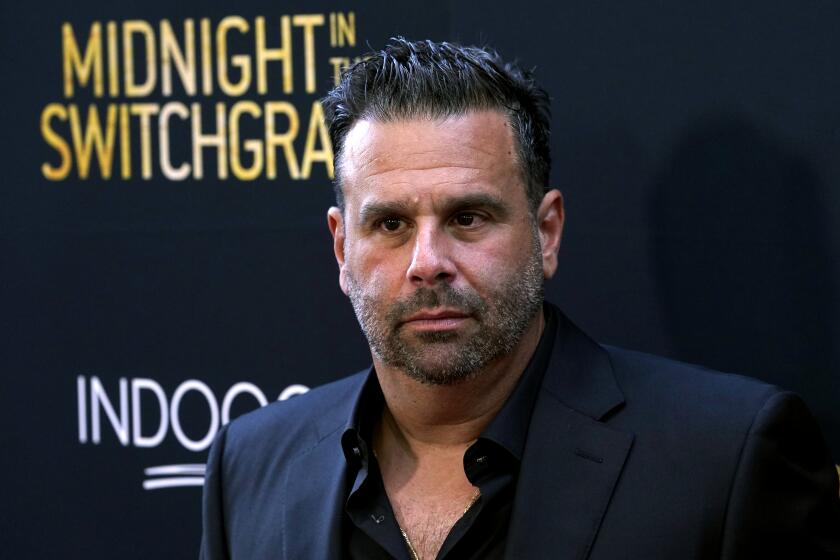This L.A. startup hopes to give up-and-coming musicians a boost — through podcasts
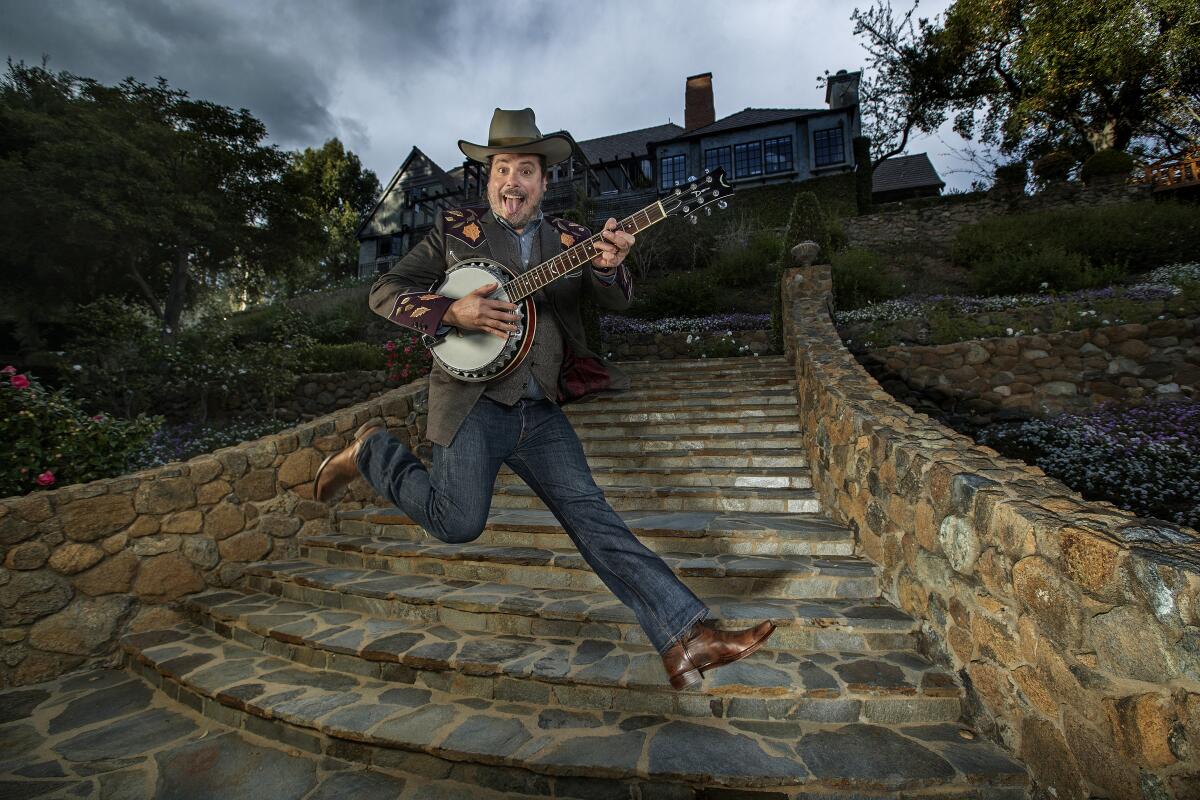
- Share via
Before her podcast, Scarlett Burke says she was a “nobody.”
The actress had small roles in TV shows, and the highest profile song she co-wrote was for a commercial about Taco Bell’s nacho fries.
But last year, her status as a songwriter rose tremendously when her music was featured in an eight-episode podcast musical called “Make It Up as We Go,” produced by L.A.-based podcast production firm Audio Up Media.
Burke portrayed the lead character in the fictional story, and more than 1 million people tuned in within eight weeks. New songs were released in the podcast, culminating with country superstar Miranda Lambert performing “Champion,” a song Burke co-wrote. Now, more artists want to write songs with her.
“Being here in Nashville and having this project has really helped create a solid foundation for me to stand on in the world of songwriting here,” 32-year-old Burke said.
As the COVID-19 pandemic shelved live concerts, aspiring artists like Burke have been looking for new ways to reach homebound audiences. Enter Audio Up, which aims to capitalize on the demand by helping musicians launch their own scripted podcast musicals — serialized stories in which musicians perform their songs and play themselves.
“I feel like we’ve caught the attention now of a music business that’s struggling to reinvent itself,” said Jared Gutstadt, Audio Up‘s chief executive. “I do think that podcasts will become as important as music videos, and I do believe that musicals of the future will evolve from the world of podcasts.”
The startup launched last year with a $4.5-million investment from MGM and other investors. Now the company is preparing to get an additional $7.5-million infusion in a second round of financing expected to close this month.
“In the same way graphic novels and comics have translated to fully realized stories and characters across the content spectrum, Audio Up is producing equally rich scripted narratives and first-class documentaries that will inspire new ideas in both the feature and series mediums,” Brian Edwards, MGM’s president of television operations, wrote in an email. “These stories will not only be deeply told, they will also have established audiences among podcast listeners. That combination is highly valuable source material on which to base new films and television series.”
As part of its agreement with MGM, Audio Up will create up to five podcasts each year and has a first-look deal with the studio.
In addition to musicals, Audio Up has other types of podcasts, including an audio version of the popular TV series “Are You Smarter Than a 5th Grader?”
The company has 19 employees and plans to produce at least 40 podcasts this year, including seven podcast musicals. The company said it has had 6.9 million streams of its podcasts to date.
Audio Up projects it will make at least $12 million in revenue this year through advertising, adapting its podcasts into films or TV shows, licensing of its IP, touring or music-related sales.
The podcasts will give consumers the ability to learn more about the artists behind their music, which will result in deeper relationships with consumers, said veteran advertising executive Howard Draft, who led Audio Up’s second round of financing.
“In the past, you were simply just getting the music,” Draft said. “Now you’re getting whatever storytelling that goes along with the music, and I think [in] the world we exist in today, people are interested in deeper relationships with the brand.”
Some are calling it the second golden age of audio.
Audio Up isn’t the first company to do podcast musicals. Brooklyn-based Two-Up Productions launched the first major podcast musical in 2017 with “36 Questions” starring Jonathan Groff, which has generated more than 5 million downloads of the podcast and more than 15 million Spotify streams of its songs. The podcast budget was $225,000. It’s now being developed into a film for Netflix.
The concept of creating a musical inspired by an existing album has also taken root on Broadway, in such shows as “Jagged Little Pill” or “American Idiot.”
While podcast musicals are not widespread yet, they can succeed with a big enough fan base, said Luke Pappas, a principal at venture capital firm New Enterprise Associates.
“Obviously, it’s unproven, but I think there’s enough precedent to say it’s worth a shot,” Pappas said.
Unlike other podcast businesses, Gutstadt produces new, original music albums with artists and then builds a scripted musical around it. For example, “Make It Up as We Go” is about a fictional aspiring singer-songwriter in Nashville, a story that echoes elements of “A Star Is Born.” Gutstadt is a producer on Burke’s album, while Burke is a producer of Audio Up’s podcast. Gutstadt says that the cost of his podcast musicals could be $150,000 to $200,000.
The pandemic has caused artists like Hero the Band to embrace Audio Up’s form of podcasting after their performances at music festivals like Bonnaroo and Shaky Knees were shelved. The Georgia band of four brothers, which signed a deal with Lava Records in 2019, will launch its first podcast musical, called “Sonic Leap,” this year, in which band members portray themselves as they travel back to the 1980s.
“It’s going to be a great way for multiple people to hear our music, without being able to see us up close and personal,” said band member DJ Barnett.
Two local giants, Live Nation and AEG, dominate the touring industry. They should be able to weather the impact of coronavirus, but others may not be so fortunate.
Jason Flom, chief executive of Lava Records, said that the cancellations or postponements of concerts have made it tougher for new artists such as Hero the Band to break through the noise.
“This presents a unique opportunity for fans to discover a band that has real personality — something beyond just great music,” Flom said. “Ultimately, it is a platform that is going to provide us a chance to present their music to people in a way that is unexpected.”
At first, some Hero the Band members hesitated about creating a podcast, which they had never done before.
Flom credits Gutstadt for pushing the podcast forward.
“Everybody loves Jared. He has this crazy force of personality that he’s able to get the most remarkable people together and unite them behind a cause just because his energy is infectious,” he said.
Gutstadt grew up in Toronto. He describes himself as a shy boy who preferred to tell stories through music rather than speaking with others. When he was assigned a report about cross-border shopping, he wrote a song about it instead.
After graduating from New York University with a master’s degree in interactive technology, he embarked on a music career (he played drums for New York country rock group the Izzys) but couldn’t earn a living.
So he took on a job as a TV editor, adding background music to reality TV shows. A producer discouraged him from adding songs from bands like Coldplay or Green Day because it was expensive, so Gutstadt asked if he could add his own original music — which earned him the nickname Jingle Jared.
“I’m like, ‘Whoa, if we did this times like 10,000 or 100,000 times, this could be a real business,’” Gutstadt recalled after seeing his first royalty check. “I got a positive financial outcome from all the years of tinkering and trying.”
That sparked the idea behind his previous startup, Jingle Punks, in 2008. The company created a digital library of licensed original music and later sold a majority stake to WME for $30 million in 2012, Gutstadt said.
Gutstadt came up with the idea for Audio Up after successfully launching a podcast musical in 2019, “Bear and a Banjo,” through iHeartMedia. It featured songs written by Gutstadt, Bob Dylan and Jason “Poo Bear” Boyd for an album that no music labels were interested in.
“We pre-sold the podcast before we had scripts,” Gutstadt said. “All we had was the songs, and they took it off the market for, like, just under a million dollars.”
Amazon Music said Wednesday that it plans to acquire West Hollywood podcast production company Wondery.
For now, Gutstadt is continuing to work on more podcasts inside Audio Up’s headquarters — a four-bedroom home in Brentwood. He has thousands of voice memos for potential songs, with titles such as “Disco Pizza Party.”
Next week, Audio Up will release its next podcast musical, “Valentine’s Day in Hell,” and recently greenlighted a second season of “Make It Up as We Go.”
Perhaps with Audio Up, Gutstadt can break free from his nickname.
“I do believe in your life you go through a certain amount of media evolutions as your personality and your business grows,” 43-year-old Gutstadt said. “I do not mind when people call me Jingle Jared, but there is a part of me that wants to be just Jared Gutstadt the music producer, the entrepreneur, the creator.”
More to Read
Inside the business of entertainment
The Wide Shot brings you news, analysis and insights on everything from streaming wars to production — and what it all means for the future.
You may occasionally receive promotional content from the Los Angeles Times.
